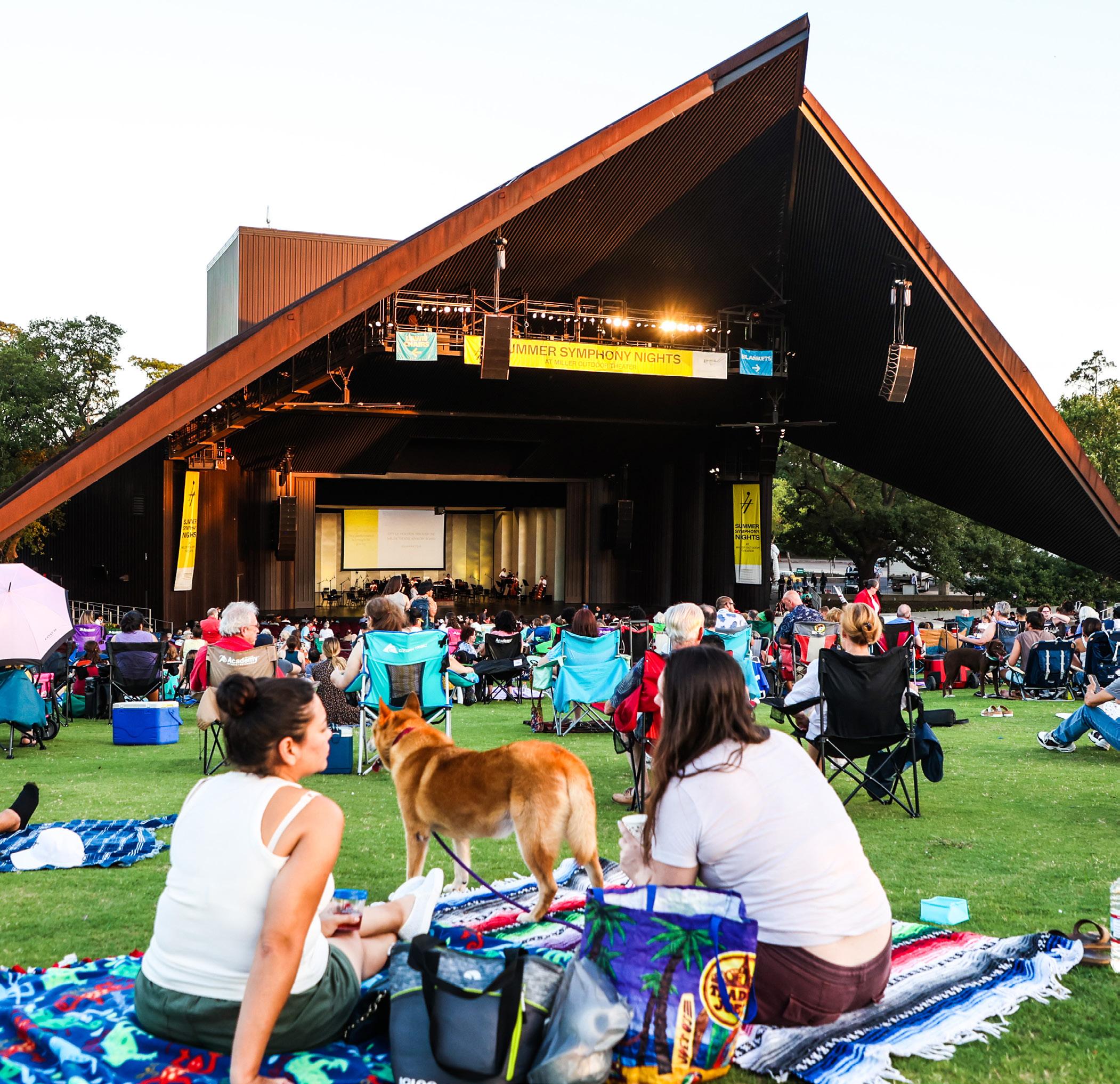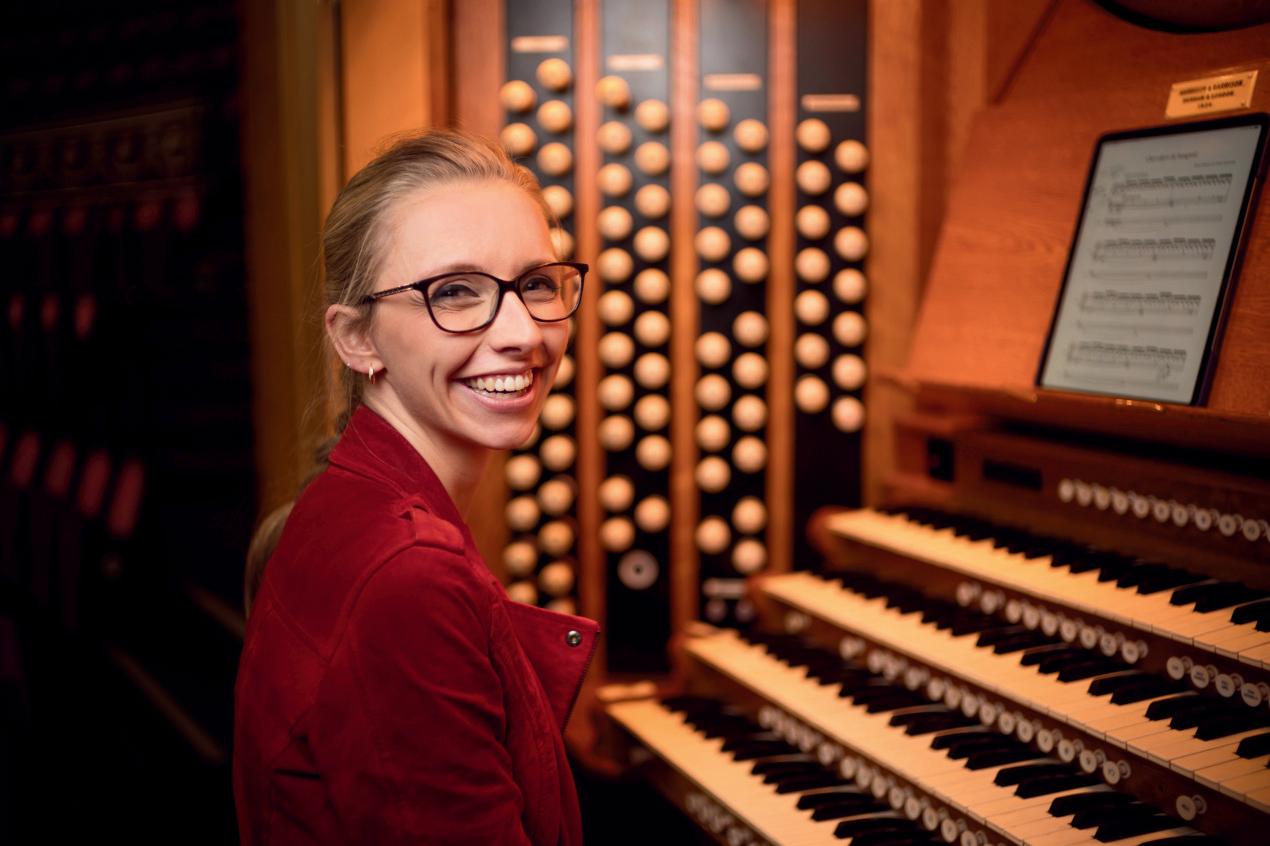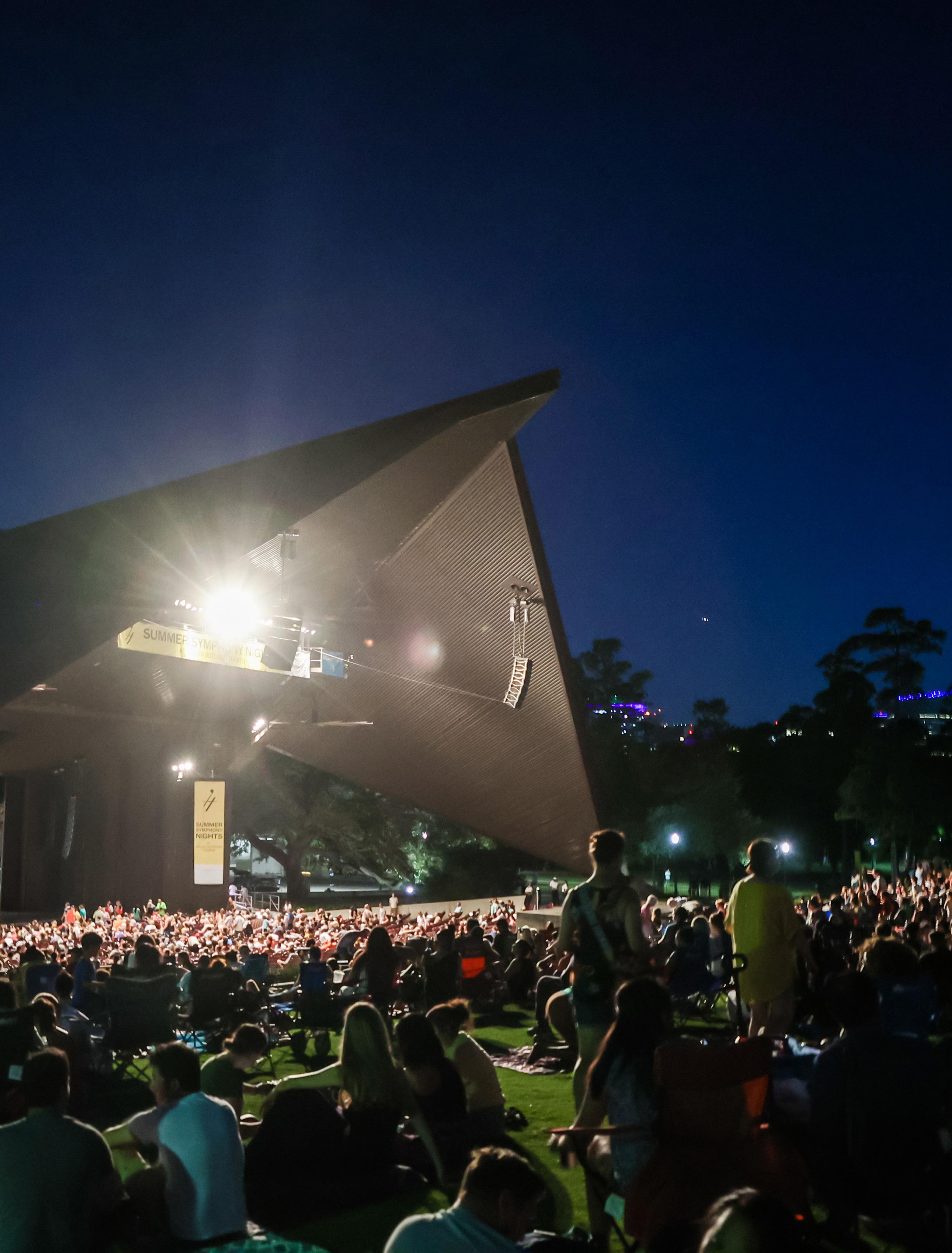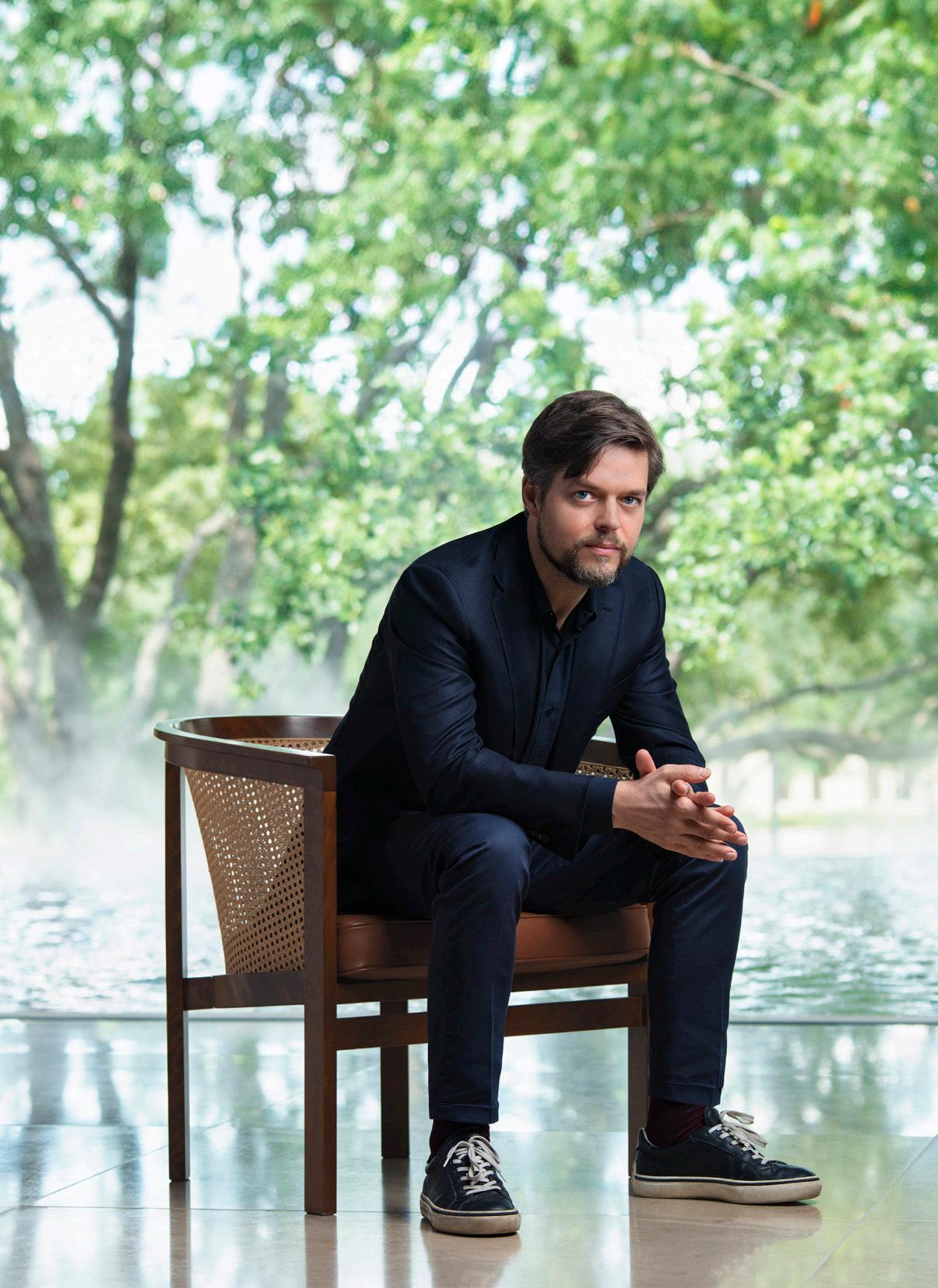InTUNE



Juraj Valčuha
Music Director
Roy and Lillie Cullen Chair
FIRST VIOLIN
Yoonshin Song, Concertmaster
Max Levine Chair
Vacant, Associate Concertmaster
Ellen E. Kelley Chair
Boson Mo, Assistant Concertmaster
Qi Ming, Assistant Concertmaster
Fondren Foundation Chair
Marina Brubaker
Tong Yan
MiHee Chung
Sophia Silivos
Rodica Gonzalez
Ferenc Illenyi
Si-Yang Lao
Kurt Johnson*
Christopher Neal
Sergei Galperin
Tianxu Liu+
SECOND VIOLIN
Vacant, Principal
Vacant, Associate Principal
Amy Semes
Annie Kuan-Yu Chen
Mihaela Frusina
Jing Zheng
Tianjie Lu
Anastasia Iglesias
Tina Zhang*
Yankı Karataş
Hannah Duncan
Alexandros Sakarellos
Samuel Park+
Teresa Wang+
VIOLA
Joan DerHovsepian, Principal
Wei Jiang, Acting Associate Principal
Samuel Pedersen, Assistant Principal
Paul Aguilar
Sheldon Person
Fay Shapiro
Keoni Bolding
Jimmy Cunningham
CELLO
Brinton Averil Smith, Principal
Janice H. and Thomas D. Barrow Chair
Christopher French, Associate Principal
Jane and Robert Cizik Chair
Anthony Kitai
Louis-Marie Fardet
Jeffrey Butler
Maki Kubota
Xiao Wong
Charles Seo
Jeremy Kreutz
COMMUNITY-EMBEDDED MUSICIAN
Lindsey Baggett, Violin
ASSISTANT LIBRARIANS
Ali Verderber
Hae-a Lee
DOUBLE BASS
Robin Kesselman, Principal
Timothy Dilenschneider, Associate Principal
Steven Reineke, Principal POPS Conductor
Andrés Orozco-Estrada, Conductor Laureate
Gonzalo Farias, Associate Conductor
Andrew Pedersen, Assistant Principal
Eric Larson
Burke Shaw
Donald Howey
Avery Weeks
Michael Zogaib+
FLUTE
Aralee Dorough, Principal
General Maurice Hirsch Chair
Matthew Roitstein, Associate Principal
Judy Dines
Kathryn Ladner
PICCOLO
Kathryn Ladner
OBOE
Jonathan Fischer, Principal
Lucy Binyon Stude Chair
Anne Leek, Associate Principal
Colin Gatwood
Adam Dinitz
ENGLISH HORN
Adam Dinitz
Barbara and Pat McCelvey Chair
CLARINET
Mark Nuccio, Principal
Bobbie Nau Chair
Vacant, Associate Principal
Christian Schubert
Alexander Potiomkin
Ben Freimuth+
E-FLAT CLARINET
Vacant
Ben Freimuth+
BASS CLARINET
Alexander Potiomkin
BASSOON
Rian Craypo, Principal
Isaac Schultz, Associate Principal
Elise Wagner
Adam Trussell
CONTRABASSOON
Adam Trussell
STAGE PERSONNEL
Stefan Stout, Stage Manager
José Rios, Assistant Stage Manager
Nicholas DiFonzo, Head Video Engineer
Justin Herriford, Head Audio Engineer
Connor Morrow, Head Stage Technician
Giancarlo Minotti, Audio Production Manager
HORN
William VerMeulen, Principal
Mr. and Mrs. Alexander K. McLanahan
Endowed Chair
Robert Johnson, Associate Principal
Nathan Cloeter, Assistant Principal/Utility
Brian Thomas*
Brian Mangrum
Ian Mayton
Barbara J. Burger Chair
Spencer Bay+
TRUMPET
Mark Hughes, Principal
George P. and Cynthia Woods
Mitchell Chair
John Parker, Associate Principal
Robert Walp, Assistant Principal
Richard Harris
TROMBONE
Nick Platoff, Principal
Bradley White, Associate Principal
Phillip Freeman
BASS TROMBONE
Phillip Freeman
TUBA
Dave Kirk, Principal
TIMPANI
Leonardo Soto, Principal
Matthew Strauss, Associate Principal
PERCUSSION
Brian Del Signore, Principal
Mark Griffith
Matthew Strauss
HARP
Allegra Lilly, Principal
KEYBOARD
Vacant, Principal
LIBRARIAN
Luke Bryson, Principal
*on leave + contracted substitute

O p e n i n g We e ken d : Val č u h a
C on du c t s St r av in s k y ’s Fi r eb i r d
S e pt e m b e r 1 9, 2 0* & 2 1
Eschenbach Conducts
Mozart & Bruckner
S e pt e m b e r 2 7 & 28*
K i n g f o r a D ay : T h e M u s i c o f El v i s
O c t o b e r 3 , 4* & 5
J ea n -Yve s T h i b a u d e t +
T h e T h r e e - C o r n e r e d H a t
O c t o b e r 1 0, 11* & 12
G e r s hw i n & G r i m a u d :
J a z z M e e t s Symp ho ny
O c t o b e r 1 7, 1 8* & 19
Fr o m St a g e t o S c r e e n :
B r o a d way Me e t s H o l l y woo d
O c t o b e r 3 1 , N ove m b e r 1* & 2
Fri g h t f u l l y Fu n ! A H a l l owe e n
C o n c e r t f o r K i d s
N ove m b e r 1
Shall We Dance?
N ove m b e r 8 & 9*
S N o s f e r a t u: S i le n t Fil m
w i t h L i ve O r g a n
N ov e m b e r 1 6
J o u r n ey t o L i g h t : Va l č u h a
C on du c t s S h o s t a kov i c h 1 0
N ove m b e r 2 1 , 2 2 * & 2 3
Th a nk s g i v i n g We e ken d :
Tcha i kovs k y ’s P i an o
C o n c e r t o N o . 1
N ove m b e r 28 , 2 9* & 3 0
H and e l s M es si a h
S
S
D ec e m b e r 5 , 6* & 7
J oy f u l Fa n fa r e s ! H o l i d ay
B r a s s S p ec t ac u l a r
D ec e m b e r 6 & 7
Vo c t ave: It Feels Like C h r i s t m a s
D ec e m b e r 8
Ve r y M e r r y Po p s
D ec e m b e r 11 , 1 3* & 1 4
O h , W h at Fu n ! A H o l i d ay
C o n c e r t f o r K i d s
D ec e m b e r 1 3
Mariachi Sol De Mexico de José Hernández presents: José Hernández’ Merry-Achi Christmas
Dec e m b e r 15
S S Elf i n C on c e r t
D ec e m b e r 1 9, 2 0 & 2 1 B a n k o f A m e r i c a P
A N at K i n g C o l e N ew Ye a r
See our full year calendar for even more concerts! J a n u a r y 2 , 3* & 4
*Pe r f o r m a n c e li ve s t r ea m e d
Barbara J. Burger
President
John Rydman Chair
Barbara McCelvey President-Elect
Mike S. Stude Chair Emeritus
Paul Morico General Counsel
Jonathan Ayre Secretary
Jonathan Ayre Chair, Finance
Brad W. Corson Chair, Governance & Leadership
Carey Kirkpatrick Chair, Marketing & Communications
Evan B. Glick Chair, Popular Programming
Barbara McCelvey Chair, Development
Sippi Khurana, M.D. Chair, Education & Community Engagement
Jonathan Ayre
Gary Beauchamp
Eric Brueggeman
Bill Bullock
Barbara J. Burger
Mary Kathryn Campion, Ph.D.
John Cassidy, M.D.
Janet F. Clark
Brad W. Corson
Lidiya Gold
Claudio Gutiérrez
Rick Jaramillo
David J. M. Key
Sippi Khurana, M.D.
Mary Lynn Marks Chair, Volunteers & Special Events
Robert Orr Chair, Strategic Planning
John Rydman Chair, Artistic & Orchestra Affairs
Jesse B. Tutor Chair, Audit
Janet F. Clark^ Immediate Past Chair
Steven P. Mach^ At-Large Member
Bobby Tudor^ At-Large Member
Leslie Nossaman^ President, Houston Symphony League
James H. Lee^ President, Houston Symphony Endowment
Juraj Valčuha^ Music Director Roy and Lillie Cullen Chair
Joan DerHovsepian^ Musician Representative
Mark Hughes^ Musician Representative
Gary Ginstling^ Executive Director/CEO
Margaret Alkek Williams Chair
As of June 1, 2025
Carey Kirkpatrick
Cindy Levit
Isabel Stude Lummis
Cora Sue Mach **
Rodney Margolis**
Mary Lynn Marks
Elissa Martin
Barbara McCelvey
Paul R. Morico
Leslie Nossaman
Robert Orr
Chris Powers
John Rydman**
Brittany Sakowitz
Ed Schneider
Justin Stenberg
William J. Toomey II
Bobby Tudor **
Betty Tutor **
Jesse B. Tutor **
Gretchen Watkins
Robert Weiner
Margaret Alkek Williams **
Wei Jiang^ Musician Representative
Mark Nuccio^ Musician Representative
Sherry Rodriguez^ Assistant Secretary ^Ex-Officio
EX-OFFICIO
Joan DerHovsepian
Gary Ginstling
Evan B. Glick
Mark Hughes
Wei Jiang
James H. Lee
Steven P. Mach
Mark Nuccio
Sherry Rodriguez
Juraj Valčuha
Christopher Armstrong
David J. Beck
Carrie Brandsberg-Dahl
Nancy Shelton Bratic
Terry Ann Brown**
Ralph Burch
John T. Cater**
Robert Chanon
Heaven Chee
Michael H. Clark
Virginia Clark
Aoife Cunningham
Andrew Davis, Ph.D.
Denise Davis
Tracy Dieterich
Joan Duff
Connie Dyer
Kelli Cohen Fein
Jeffrey B. Firestone
Lindsay Buchanan Fisher
Eugene A. Fong
Aggie L. Foster
Julia Anderson Frankel
Carolyn Gaidos
Evan B. Glick
Andrew Gould
Lori Harrington
Jeff Hiller
Grace Ho
Gary L. Hollingsworth
John W. Hutchinson
Brian James
Dawn James
Matthew Kades
I. Ray Kirk, M.D.
David Krieger
Matthew Loden
Steven P. Mach
Michael Mann, M.D.
Nancy Martin
Jack Matzer
Jackie Wolens Mazow
Aprill Nelson
Tim Ong
PAST PRESIDENTS OF THE HOUSTON SYMPHONY SOCIETY
Mrs. Edwin B. Parker
Miss Ima Hogg
Mrs. H. M. Garwood
Joseph A. Mullen, M.D.
Joseph S. Smith
Walter H. Walne
H. R. Cullen
Gen. Maurice Hirsch
Charles F. Jones
Fayez Sarofim
John T. Cater
Richard G. Merrill
Ellen Elizardi Kelley
John D. Platt
E.C. Vandagrift Jr.
J. Hugh Roff Jr.
PAST PRESIDENTS OF THE HOUSTON SYMPHONY LEAGUE
Miss Ima Hogg
Mrs. John F. Grant
Mrs. J. R. Parten
Mrs. Andrew E. Rutter
Mrs. Aubrey Leno Carter
Mrs. Stuart Sherar
Mrs. Julian Barrows
Ms. Hazel Ledbetter
Mrs. Albert P. Jones
Mrs. Ben A. Calhoun
Mrs. James Griffith Lawhon
Mrs. Olaf LaCour Olsen
Mrs. Ralph Ellis Gunn
Mrs. Leon Jaworski
Mrs. Garrett R. Tucker Jr.
Mrs. M. T. Launius Jr.
Mrs. Thompson McCleary
Mrs. Theodore W. Cooper
Mrs. Allen W. Carruth
Mrs. David Hannah Jr.
Mary Louis Kister
Mrs. Edward W. Kelley Jr.
Mrs. John W. Herndon
Mrs. Charles Franzen
Mrs. Harold R. DeMoss Jr.
Mrs. Edward H. Soderstrom
Mrs. Lilly Kucera Andress
Ms. Marilou Bonner
Mrs. W. Harold Sellers
Mrs. Harry H. Gendel
Mrs. Robert M. Eury
Mrs. E. C. Vandagrift Jr.
FOUNDATION FOR JONES HALL REPRESENTATIVES
Janet F. Clark
Edward Osterberg Jr.
Gloria G. Pryzant
Miwa Sakashita
Ted Sarosdy
Andrew Schwaitzberg
Helen Shaffer**
Becky Shaw
Robert B. Sloan, D.D., Theol.
Jim R. Smith
Miles O. Smith**
Quentin Smith
Tad Smith
Anthony Speier
Tina Raham Stewart
Mike S. Stude**
Nanako Tingleaf
Margaret Waisman, M.D.
Fredric A. Weber
Vicki West
Steven J. Williams
David J. Wuthrich
Ellen A. Yarrell
Robert M. Hermance
Gene McDavid
Janice H. Barrow
Barry C. Burkholder
Rodney H. Margolis
Jeffrey B. Early
Michael E. Shannon
Ed Wulfe
Mrs. J. Stephen Marks
Terry Ann Brown
Nancy Strohmer
Mary Ann McKeithan
Ann Cavanaugh
Mrs. James A. Shaffer
Lucy H. Lewis
Catherine McNamara
Shirley McGregor Pearson
Paula Jarrett
Cora Sue Mach
Kathi Rovere
Norma Jean Brown
Barbara McCelvey
Lori Sorcic Jansen
Nancy B. Willerson
Robert Yekovich
EX-OFFICIO
Alejandro Gallardo
Reverend Ray Mackey, III
Frank F. Wilson IV
**Lifetime Trustee
*Deceased
Barbara McCelvey Fredric Weber
Jesse B. Tutor
Robert B. Tudor III
Robert A. Peiser
Steven P. Mach
Janet F. Clark
John Rydman
Jane Clark
Nancy Littlejohn
Donna Shen
Dr. Susan Snider Osterberg
Dr. Kelli Cohen Fein
Vicki West
Mrs. Jesse Tutor
Darlene Clark
Beth Wolff
Maureen Higdon
Fran Fawcett Peterson
Leslie Siller
Cheryl Byington
Mary Fusillo
Heidi Rockecharlie
LEADERSHIP GROUP
Gary Ginstling, Executive Director/CEO
Margaret Alkek Williams Chair
Elizabeth S. Condic, Chief Financial Officer
Vicky Dominguez, Chief Operating Officer
Jennifer Renner, Chief Development Officer
Alex Soares, Chief Marketing Officer
DEVELOPMENT
Sarah Bhalla, Development Officer
Lauren Buchanan, Development Communications Manager
Alex Canales, Senior Development Ticket Concierge
Jessie De Arman, Development Associate, Gifts and Records
Timothy Dillow, Senior Director of Development
Amanda T. Dinitz, Senior Major Gifts Officer
Vivian Gonzalez, Development Officer
Kamra Kilmer, Development Gift Officer
Karyn Mason, Development Officer
Hadia Mawlawi, Senior Associate, Endowment and Planned Giving
Meghan Miller, Special Events Associate
Mayenne Minuit, Development Associate, Administration
Emilie Moellmer, Annual Fund Manager
Megan Mottu, Development Officer
Tim Richey, Director, Individual Giving
Sherry Rodriguez, Corporate Relations Manager & Board Liaison
Katie Salvatore, Major Gifts Officer
Lena Streetman, Manager, Research and Development Operations
Stacey Swift, Director, Special Events
Sarah Thompson, Donor Stewardship Manager
Christina Trunzo, Director, Foundation Relations
Alexa Ustaszewski, Major Gifts Officer
EDUCATION | COMMUNITY ENGAGEMENT
Olivia Allred, Education Manager
Allison Conlan, Senior Director, Education and Community Engagement
Austin Hinkle, Education and Community Engagement Coordinator
Cedric Mayfield, Project Manager, Evaluation
Jazmine Olwalia, Community Engagement Associate
Sheridan Richard, DeLUXE K!ds In Harmony Site Manager
Community-Embedded Musicians (CEM):
Lindsey Baggett, Lead CEM
Lucinda Chiu, CEM Teaching Artist
David Connor, CEM Teaching Artist
Stephen Hudson, CEM Education Specialist
Rainel Joubert, CEM Teaching Artist
Bianca Lozano, CEM Teaching Artist
Alexis Mitrushi, CEM Teaching Artist
José Arriaga, Systems Engineer
Henry Cantu, Finance Accountant
Kimberly Cegielski, Staff Accountant
Heather Fails, Database Administrator
Joel James, Director of Human Resources
Tanya Lovetro, Director of Budgeting and Financial Reporting
Freddie Piegsa, Help Desk Technician
Morgana Rickard, Controller
Gabriela Rivera, Senior Accountant
Pam Romo, Office Manager/HR Coordinator
Lee Whatley, Senior Director, IT and Analytics
Bryan Ayllon, Web Coordinator
Mark Bailes, Marketing Revenue Manager
Rachel Cheng, Marketing and External Relations Assistant
Bella Cutaia, Patron Services Senior Representative
Ruben Gandara, Patron Services Representative
Kathryn Judd, Director, Marketing
Priya Kurup, Senior Associate, Group Sales
Caroline Lawson, Patron Services Representative
Lien Le, Patron Experience Coordinator
Yoo-Ell Lee, Graphics and Media Designer
Ciara Macaulay, Creative Director
Ashley Martinez, Patron Services Coordinator
Mariah Martinez, Email Marketing Coordinator
Casey Pearce, Graphic Design Manager
Aracely Quevedo, Patron Services Representative
Eric Skelly, Senior Director, Communications
Christian Sosa, Web Experience Director
Jonathan Townsend, Patron Services Representative
Jenny Zuniga, Director, Patron Services
Stephanie Alla, Associate Director of Artistic Planning
Becky Brown, Associate Director, Orchestra Personnel
Michael Gorman, Director, Orchestra Personnel
Julia Hall, Interim Director, Chorus
Adrian Hernandez, Concert Media Production Manager
Hazel Landers, Chorus Library Intern
Hae-a Lee, Assistant Librarian
Giancarlo Minotti, Audio Production Manager
Elena Reid, Artistic Intern
José Rios, Assistant Stage Manager
Brad Sayles, Senior Recording Engineer
Claudia Schmitz, Artistic Coordinator and Assistant to the Music Director
Stefan Stout, Stage Manager
Nathan Trinkl, Artistic Assistant
Ali Verderber, Assistant Librarian
Meredith Williams, Director of Concert Operations
Rebecca Zabinski, Senior Director, Artistic Planning







Anna's program brings together different musical worlds! We’ll hear Tchaikovsky's 'Sleeping Beauty Waltz' next to an arrangement of Robbie Williams' 'Angels,' and iconic
by


“Imaginative, open-minded and a brilliant musician, the organist and conductor Anna Lapwood is the dream ambassador for classical music.”Gramophone

*Anna Rakitina, conductor
0:15 E. REID – Floodplain
0:21 TCHAIKOVSKY – Romeo and Juliet, Overture-Fantasy INTERMISSION
0:46 SHOSTAKOVICH – Symphony No. 5 in D minor, Opus 47
I. Moderato
II. Allegretto
III. Largo
IV. Allegro non troppo
*Houston Symphony debut


Friday, July 18
THANK YOU TO OUR SPONSORS

City of Houston through the Miller Theatre Advisory Board Guarantor
The Houston Symphony’s Miller Outdoor Theatre concerts are endowed by The Brown Foundation, Inc. in memory of Stewart and Hanni Orton
The Houston Symphony’s sound shell ceiling is made possible through the generosity of the Beauchamp Foundation and the Fondren Foundation
8:30 p.m.
This evening, the orchestra welcomes Russian conductor Anna Rakitina to Miller Outdoor Theatre for her Houston Symphony debut. A rising star who has recently made acclaimed debuts in Boston, Chicago, San Francisco, New York, and Los Angeles, Rakitina is also a champion of new music and of American composer Ellen Reid in particular.
Winner of the 2019 Pulitzer Prize for Music, Reid composed Floodplain in the wake of the COVID pandemic, producing a nature tone poem that is both sumptuously scored and evocatively emotional. Rakitina rounds out the program with two Russian classics. One of its composer’s first masterpieces, Tchaikovsky’s Romeo and Juliet, Overture-Fantasy ranks among the most potent musical responses to Shakespeare’s play with its famous love theme and violent vendetta music.
Contemporaneous with Stalin’s purges of the late 1930s, Shostakovich’s Symphony No. 5 was on the surface an attempt to appease Stalin after the Soviet dictator signed his name to a scathing review of Shostakovich’s hit opera Lady Macbeth of the Mtsensk District, an event which led to a ban of Shostakovich’s music at a time when other targeted artists were being murdered or deported to Siberian gulags.
Although the symphony did restore Shostakovich to the regime’s good graces, many have also heard it as a trenchant critique of the totalitarian era in which he lived. The symphony’s ending in particular—triumphant on the surface, but a symbol of oppression for many listeners— demonstrates the power of music to hold within it multiple layers of meaning. The work remains a testament to the horrors of Stalinism and warning to posterity of the dangers of authoritarian rule. —Calvin Dotsey
E. REID Floodplain (2022)
Ellen Reid is today widely recognized as one of the United States’ leading composers; her path to a career in music, however, was an unexpected one. Born in 1983, Reid grew up in Oak Ridge, Tennessee. Her early musical experiences included piano lessons, singing in the church choir, and jamming to “an album I had, The Best of the Girl Groups Volume 1,” as she told the San Francisco Classical Voice in a 2021 interview. Her exposure to classical music increased when she moved to New York to attend college at Columbia University. “I started writing music in college. I think it is not that rare, especially for women, to start writing a little later,” she explained to New Music USA in 2019. Initially interested in the sociology of music, she began composing outside her coursework for musicals and theater. Subsequently, Reid pivoted to composition, pursuing a master’s degree at the California Institute of the Arts. She also spent time in Thailand, where encounters with Thai classical opera proved profoundly influential on her development as a composer.
Although Reid has written works in virtually all imaginable genres, perhaps at heart she is an opera composer; indeed, it was for her 2018 opera p r i s m that she won the 2019 Pulitzer Prize for Music. In all her works, her keen dramatic instincts and love of the beauty of sound for its own sake are readily apparent.
Floodplain is no exception. Commissioned by the Los Angeles Chamber Orchestra, Reid began composing the work in early 2020, but progress was interrupted by the COVID-19 pandemic. She returned to the piece about two years later. “Floodplain emerged as a wholly different work than the one I had conceived before the pandemic,” she noted in her own program note for the piece. Regarding the title, Reid notes that “A floodplain is a low-lying area of land near a river whose role changes depending on precipitation and weather—it can morph from a fertile home for grasses, plant, and animal life to a silty bed for the swollen river. In writing Floodplain, I was inspired by this landscape that is both lush and dangerous.”
With its upward-thrusting brass motifs and shimmering orchestral textures, the work’s opening firmly places it in the tradition of 19th century nature tone poems with roots in the “Forest Murmurs” from Wagner’s Siegfried. Harmonically, there are also hints of Copland’s wideopen American landscapes, although these influences are thoroughly updated with a range of contemporary techniques drawn from the postminimalist style so prevalent in recent decades.
Perhaps reflecting her theatrical bent, Reid makes use of dramatic pauses throughout the work. Peppered throughout the score are enigmatic expressive markings: the piece opens “with Vigorous Joy;” soon after, a flowing string melody is “Luminous and Gentle;” increasingly dissonant harmonies signal “an Unearthing,” which gives way to a “Fragile, Transparent” melody for woodwinds; a lush string chorale is “Committed,” then “Passionate” as more instruments join; a cello solo is “Spinning Paranoia,” which quickly becomes “Seething Rage;” after this intense passage, a violin solo is marked “From Anger
E. REID Floodplain (2022)
Comes Clarity;” the return of the strings are “Resurgent Brooding Thoughts,” which after a dramatic pause become “Deeper and Darker;” after a powerful climax, we reach “Something Like Peace” with tremolo strings supporting another cello solo; this gives way to “Something Like a Prayer,” diaphanous music which fades to the work’s still, quiet ending.
—Calvin Dotsey
TCHAIKOVSKY
Romeo and Juliet, OvertureFantasy (1880)
We often imagine that artistic geniuses are solitary creatures who do their best work alone, but this is not always so; in some instances, collaboration and constructive criticism prove instrumental in the genesis of a masterpiece. Such is the case with Tchaikovsky’s Romeo and Juliet, Overture-Fantasy, one of the composer’s first mature works. We owe the piece to Mily Balakirev, the leader of a group of composers in St. Petersburg known as “the Five” that most notably included Nikolay Rimsky-Korsakov, Modest Mussorgsky, and Alexander Borodin. Balakirev suggested composing a piece based on Shakespeare’s play to Tchaikovsky while visiting Moscow during the summer of 1869, and Tchaikovsky took to the idea immediately; as a closeted gay man living in 19th-century Russia, it is easy to see how the classic story of forbidden love would have had parallels in his own life. Initially, however, he struggled with writer’s block. He wrote to Balakirev, “I am played out completely, and not a single tolerable little musical idea will creep into my head.”
In response, Balakirev sent him a detailed plan: a slow introduction would depict Friar Lawrence; a fast, stormy theme the vendetta between the Montagues and Capulets; a contrasting, lyrical melody would evoke the young lovers; and the ensuing development, reprise of the main themes, and coda would suggest the outline of the tragedy. Balakirev’s suggestions seemed just the stimulus Tchaikovsky needed, and Tchaikovsky produced a piece that followed Balakirev’s plan to the letter. The premiere of this first version took place in Moscow in March 1870, but remarkably, it failed to make an impression. “My overture had no success whatever here,” Tchaikovsky wrote to a friend. Balakirev urged revisions, and during the summer of 1870, Tchaikovsky made substantial changes to the Overture-Fantasy. This brought the piece much closer to what we know today, but Balakirev was still unsatisfied, writing, “I feel strongly that you need to make further revisions to the overture, and not just to wave your hand at it, and hope for the best in your future compositions.” Tchaikovsky, however, conceded, “I could cheerfully make some further revisions, but […] I have absolutely no more energy for this task.”
Only 10 years later would he return to the overture to recompose the ending. Tchaikovsky was now convinced the work was “a genuine chef d’oeuvre,” and posterity has agreed with him. —Calvin Dotsey
Symphony No. 5 in D minor, Opus 47 (1937)
In January 1934, Dmitri Shostakovich scored one of the biggest triumphs of his career with the premiere of Lady Macbeth of the Mtsensk District, which would play to full houses in Moscow and Leningrad for two years. Then on January 26, 1936, Stalin went to see it.
Two days later, on page three of Pravda, Shostakovich found a damning, anonymous review of Lady Macbeth headlined Muddle Instead of Music, which declared that the opera “tickles the perverted tastes of the bourgeoisie with its fidgety, screaming, neurotic music…” Many have speculated that the review was written by Stalin himself. Shostakovich’s denunciation occurred in the wider context of Stalin’s purges, which began in late 1934 with the elimination of Communist Party leaders whose loyalty to Stalin was questionable, but later spread to every stratum of society.
According to official Soviet records, 681,692 people would be executed as part of the purges in 1937–38 (although the real number is likely closer to one million). Among those who were executed or deported to Siberian labor camps would be a number of Shostakovich’s friends and colleagues. Performances of Shostakovich’s music soon ceased, and his income plummeted.
The crisis could not have come at a worse time, as Shostakovich and his wife were expecting the birth of their first child. With public figures disappearing every day, Shostakovich knew that to survive, he would have to compose a work that would appear to glorify the state with grandeur, heroism, and a happy ending. That work would be his Fifth Symphony.
The symphony begins with a stark motto in the strings that leads to a bleak, wandering first theme in the violins. Gradually, more instruments enter as the music transitions to a new theme, which appears above a pulsing accompaniment. Despite glimmers of warmth, this second theme extends the atmosphere of profound melancholy created by the first.
After this theme dies away, the music begins to accelerate with a new, short-short-long rhythm in the piano and pizzicato lower strings. Above it, the first theme takes on a more menacing guise in the horns.
The music becomes faster and faster, until the first theme returns as a grotesque, militaristic march. The opening motto then returns in an extended passage of terror, climaxing with a brutal, condensed form of the first theme. After this violent passage, the second theme returns as a duet between a solo flute and horn. In the coda, the music becomes weaker and weaker, ending with the haunting sound of the celesta. After a brusque opening in the cellos and basses, the second movement launches into a parody of a waltz, featuring “wrong” note harmonies, unexpected turns, and grotesque circus music.
This movement features a multiplicity of instrumental colors, and it is easy to imagine different instruments caricaturing various types from Soviet society, some sincere, some sarcastic, and some coercive. Composed in only three days, the third movement contains some of Shostakovich’s most affecting music; scholar Michael Mishra relates that, “What so moved the Leningrad audience, many of them to tears,
Symphony No. 5 in D minor, Opus 47 (1937)
at the premiere was this simple, naked outpouring of tragic meditation and lyricism” at a time when artistic expressions of grief were effectively banned.
Many of those in the audience would have known people who had disappeared in the purges, people whose loss they were unable to mourn publically. Featuring divisi strings, the movement slowly builds to a powerful, cathartic climax before dying away. The finale roars into being with fiery woodwind trills before a bombastic theme appears in the trombones. The first four notes of the theme were taken from a secret, unpublished song Shostakovich had recently written to words by Pushkin: “With sleepy brush the barbarian artist/The master’s painting blackens…” The notes are the same ones used to set the words “a barbarian artist,” suggesting that this theme symbolizes Stalin himself. The music races ahead relentlessly, building to a forced-celebratory theme that quickly disintegrates. This second theme then reemerges as a poignant horn solo, followed by a passage for strings that sounds choked by tears. The music becomes softer and softer until the “barbarian artist” theme returns accompanied by timpani and snare drum. The theme builds to a violent episode punctuated by blows from the bass drum. Finally, the music breaks into a hollow, D major apotheosis of the “barbarian artist” theme with pounding timpani.
The applause at the Leningrad premiere lasted more than half an hour, causing Shostakovich’s friends to caution him against taking too many bows, lest his success be seen as a demonstration. The state critics, who knew nothing of the symphony’s connection to Pushkin’s poem, hailed the symphony as “A work of such philosophical depth and emotional force [as] could only be created here in the USSR.” Shostakovich had given them their forced happy ending, and he was back in the party’s good graces—for the time being. —Calvin Dotsey

Anna Rakitina , conductor
Anna Rakitina has firmly established herself as one of the most sought-after conductors of her generation following a series of highly acclaimed appearances with Chicago, Boston, and San Francisco Symphony Orchestras as well as the New York Philharmonic, Los Angeles Philharmonic, Gewandhausorchester Leipzig, Tonkünstler-Orchester, Swedish
Yomiuri Nippon Symphony Orchestra.
The 2024–25 Season saw Rakitina make debuts with City of Birmingham Symphony Orchestra, Gothenburg Symphony Orchestra, Sønderjyllands Symfoniorkester, Norrköping Symphony Orchestra, Ulster Orchestra, and North Carolina Symphony. In May 2025, as part of the Leipzig Shostakovich Festival, she conducted a specially Radio Symphony Orchestra, and
assembled festival orchestra consisting of young musicians from the Gewandhaus Orchestra’s Mendelssohn Orchestra Academy, the Tanglewood Music Center Orchestra, and students from the University of Music and Theatre “Felix Mendelssohn Bartholdy” Leipzig. She also appears with many other European orchestras this season.
Rakitina regularly collaborates with soloists including Jean-Yves Thibaudet, Inon Barnatan, Joshua Bell, Renaud Capuçon, Augustin Hadelich, Lucas and Arthur Jussen, Gil Shaham, Christian
Tetzlaff, and Alisa Weilerstein. She continues to champion music by today’s composers.
Rakitina was Assistant Conductor of the Boston Symphony Orchestra from 2019 to 2023, only the second woman in the orchestra’s history to hold the position. In 2025, she received the prestigious European Cultural Award in recognition of her unique talent. Sept. 12 Miller Outdoor Theatre

Houston Symphony Music Director Juraj Valčuha makes his first ever appearance at Miller Outdoor Theatre!
Presenting Sponsor